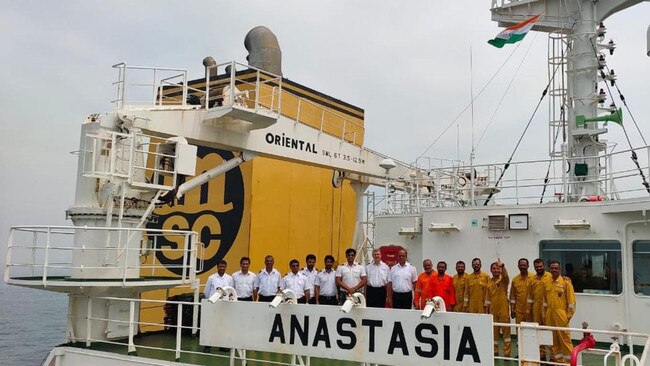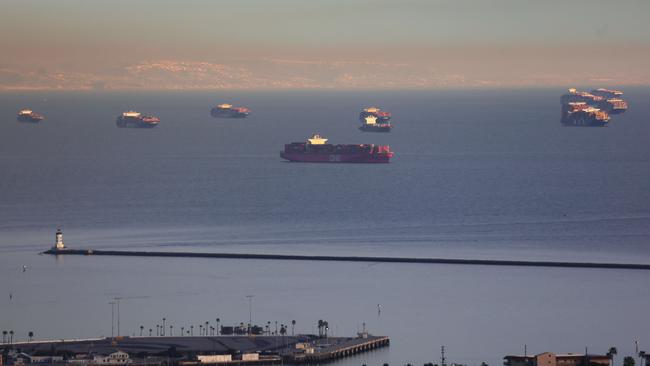No port in a storm for Beijing’s water torture victims
The brazen cruelty heaped upon these 18 young men by China is a story that plagues you through the night.

From time to time in journalism, you come across stories that plague you through the night, meaning you can’t sleep for thinking about the human being stuck in awful circumstances.
The anxiety comes mainly because, no matter what you do, you can’t find a way to help.
This is one of those stories.
Eighteen young men are stuck aboard the MV Anastasia off the coast of China.
They have been on that ship for more than a year.
They can’t unload, and they can’t disembark; they were supposed to be home months ago, but instead are simply sitting on the water.
Nobody is telling them anything; and can you even imagine their anguish?
By day, they hold up Texta signs for Facebook and Twitter, saying things like:
Please help us.
We are human, too.
I want to go home.
We — the journalists — reach them by Skype and WhatsApp for interviews, and they are unfailingly polite. They remain optimistic, and the interviews with them are all the more tragic for that. Because no matter how many of us have published yarns, tweeted and Facebooked, the plight of these men somehow never seems to capture the public’s imagination.
I can’t understand why.
It’s a really horrible situation: none of these lads has done anything wrong.
They came to Australia in July to pick up a shipment of coal; they delivered it as requested to China in September and, since then, they have been anchored off the east coast, and China won’t even allow a crew change.
It is using them to make a point, in its disputes with India and Australia.
It is completely cruel, but I guess we can expect that. China does not have a strong human rights record.
What should trouble the world is how China is flouting the ancient rules of seafaring without which trade ceases to operate.
What is the point of ancient and storied maritime law, of phrases like “safe harbour” and “any port in a storm” when China won’t abide by the most basic rules?
You are not allowed to leave seamen stranded like this.
In the beginning, they thought, okay, this will maybe last a week or two. They have food, and some medical supplies, and the internet, but how can people live like that for months, and now years on end?
Most of the crew mostly no longer leave their cabins. They are like zombies, in the pit of despair. It’s become almost impossible to keep their spirits up.
Why is it happening?

Some say China is trying to punish Australia by not letting them unload, after the Morrison government queried the origins of COVID-19.
But this particular stand-off doesn’t hurt Australia. The coal on board has been sold, and the money has been paid.
Also, vessels from Russia, Canada and Europe have been permitted to offload their Australian coal and depart Chinese waters.
Others say it’s to do with tensions between China and India — most of the crew are Indian — over the Line of Actual Control (LAC) boundary between the two superpowers. A territorial clash in the disputed Ladakh region left 20 soldiers dead in June.
China’s Foreign Ministry cites COVID protocols, adding: “These are all based on science.”
But that can’t be right.
The crew has been at sea for 20 months (they could not disembark in Australia.) They do not — could not possibly — have COVID.
Their psychological turmoil has upset the staff of the Indian embassy in Beijing, who have been trying to break the deadlock.
As for Australia, well, the vessel is hauling 90,000 tonnes of Australian coal, so the Australian government is of course busy “making representations” and “expressing concern”, but what can it actually do?
The answer is squat.
Also, to whom does one protest?
The MV Anastasia is owned by the Swiss-Italian Mediterranean Shipping Company. But it was chartered to Jiangsu Steamship, a Chinese company. The intended receiver of its coal is E-Commodities Holding, incorporated in the British Virgin Islands and listed on the Hong Kong Stock Exchange. The vessel flies a Panamanian flag.
This tangle of interests is designed to enable all the parties to minimise tax and scrimp on worker entitlements, and everyone knows it.
But it’s the 18 sailors on board who today bear the brunt.
Navigation Officer Gaurav Singh has taken it upon himself to try to make connections with journalists overseas. He speaks English and he’s by nature optimistic.
In the latest video, he remains hopeful, and their demands are so modest: they want to get off the ship so they can see their families.
One has a child who was five and is now six. One has a parent who has died.
“When the whole world stopped (for COVID), we were working continually and honestly,” Singh says.
And now it’s time for them to be allowed to go home.
“We haven’t made any mistake. We are just doing our job. We are physically and mentally exhausted, and we are scared because God knows when it will end,” he says.
The media has been doing what it can: Nine newspapers, the ABC, The Saturday Paper’s Anna Krien, CNN, The New York Times, as well as The Australian, have all tried to put a spotlight on the story.

In December, the crew posted a simple postcard, by way of thanks, to Twitter. It featured a snowman wearing a top hat, two small Christmas trees, and a Santa Claus.
“We wish you a happy Christmas. A small decoration by our staff for you all,” it said.
Most of the journalists who received the message wept, because of all the stories any of us ever worked on, this one has proven the toughest, when it comes to getting traction.
You post, and you get maybe three likes.
That was December. It’s now February and they are still there.
Now it’s Chinese New Year, and they have pretty much given up hope of anything happening while that’s under way.
Are we, as citizens of the world, really going to sit back and do nothing in the face of China’s cruelty, and this cry for help?
These young men have done nothing wrong. They came to Australia to collect our coal. They delivered it, as promised. They stand ready to unload, and disembark, and make their way home to their families.
That’s their side of the bargain. Like it or not, they are something like our partners, in this trade.
They are also fellow human beings. To leave them there, without doing anything or saying anything, is just wrong.

